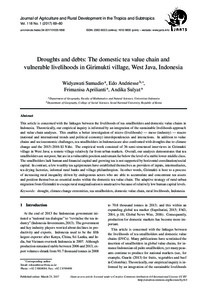Aufsatz

Droughts and debts: The domestic tea value chain and vulnerable livelihoods in Girimukti village, West Java, Indonesia
Zusammenfassung
This article is concerned with the linkages between the livelihoods of tea smallholders and domestic value chains in Indonesia. Theoretically, our empirical inquiry is informed by an integration of the sustainable livelihoods approach and value chain analyses. This enables a better investigation of micro (livelihoods) — meso (industry) — macro (national and international trends and political economy) interdependencies and interactions. In addition to value chains and socioeconomic challenges, tea smallholders in Indonesia are also confronted with droughts due to climate change and the 2015–2016 El Niño. The empirical work consisted of 36 semi-structured interviews in Girimukti village in West Java; a remote village relatively far from urban markets. Overall, our analysis demonstrates that tea smallholders are not poor, but are in a vulnerable position and remain far below the level of a stable lower-middle class. The smallholders lack human and financial capital and growing tea is not supported by horizontal coordination/social capital. In contrast, a few wealthy tea agripreneurs have established themselves as providers of inputs, intermediaries, tea drying factories, informal rural banks and village philanthropists. In other words, Girimukti is host to a process of increasing rural inequality driven by endogenous actors who are able to accumulate and concentrate tea assets and position themselves as essential nodes within the domestic tea value chain. The adaptive strategy of rural-urban migration from Girimukti to escape rural marginalisation is unattractive because of relatively low human capital levels.
Zitierform
In: Journal of Agriculture and Rural Development in the Tropics and Subtropics. Kassel : Kassel University Press. - Vol. 118, No. 1 (2017) S. 69-80Sammlung(en)
Vol 118, No 1 (2017) (Journal of Agriculture and Rural Development in the Tropics and Subtropics (JARTS))Zitieren
@article{urn:nbn:de:hebis:34-2017010351858,
author={Sumadio, Widyawati and Andriesse, Edo and Aprilianti, Frimanisa and Sulyat, Andika},
title={Droughts and debts: The domestic tea value chain and vulnerable livelihoods in Girimukti village, West Java, Indonesia},
year={2017}
}
0500 Oax 0501 Text $btxt$2rdacontent 0502 Computermedien $bc$2rdacarrier 1100 2017$n2017 1500 1/eng 2050 ##0##urn:nbn:de:hebis:34-2017010351858 3000 Sumadio, Widyawati 3010 Andriesse, Edo 3010 Aprilianti, Frimanisa 3010 Sulyat, Andika 4000 Droughts and debts: The domestic tea value chain and vulnerable livelihoods in Girimukti village, West Java, Indonesia / Sumadio, Widyawati 4030 4060 Online-Ressource 4085 ##0##=u http://nbn-resolving.de/urn:nbn:de:hebis:34-2017010351858=x R 4204 \$dAufsatz 4170 7136 ##0##urn:nbn:de:hebis:34-2017010351858
<resource xsi:schemaLocation="http://datacite.org/schema/kernel-2.2 http://schema.datacite.org/meta/kernel-2.2/metadata.xsd"> 2017-03-28T10:20:43Z 2017-03-28T10:20:43Z 2017-03-23 1612-9830 2363-6033 urn:nbn:de:hebis:34-2017010351858 http://hdl.handle.net/123456789/2017010351858 eng Kassel University Press Urheberrechtlich geschützt https://rightsstatements.org/page/InC/1.0/ drought climate change extremities tea smallholders domestic value chain rural livelihoods Indonesia 630 Droughts and debts: The domestic tea value chain and vulnerable livelihoods in Girimukti village, West Java, Indonesia Aufsatz This article is concerned with the linkages between the livelihoods of tea smallholders and domestic value chains in Indonesia. Theoretically, our empirical inquiry is informed by an integration of the sustainable livelihoods approach and value chain analyses. This enables a better investigation of micro (livelihoods) — meso (industry) — macro (national and international trends and political economy) interdependencies and interactions. In addition to value chains and socioeconomic challenges, tea smallholders in Indonesia are also confronted with droughts due to climate change and the 2015–2016 El Niño. The empirical work consisted of 36 semi-structured interviews in Girimukti village in West Java; a remote village relatively far from urban markets. Overall, our analysis demonstrates that tea smallholders are not poor, but are in a vulnerable position and remain far below the level of a stable lower-middle class. The smallholders lack human and financial capital and growing tea is not supported by horizontal coordination/social capital. In contrast, a few wealthy tea agripreneurs have established themselves as providers of inputs, intermediaries, tea drying factories, informal rural banks and village philanthropists. In other words, Girimukti is host to a process of increasing rural inequality driven by endogenous actors who are able to accumulate and concentrate tea assets and position themselves as essential nodes within the domestic tea value chain. The adaptive strategy of rural-urban migration from Girimukti to escape rural marginalisation is unattractive because of relatively low human capital levels. open access In: Journal of Agriculture and Rural Development in the Tropics and Subtropics. Kassel : Kassel University Press. - Vol. 118, No. 1 (2017) S. 69-80 Sumadio, Widyawati Andriesse, Edo Aprilianti, Frimanisa Sulyat, Andika Gedruckte Ausg. im Verlag Kassel Univ. Press (www.upress.uni-kassel.de) erschienen. </resource>
Die folgenden Lizenzbestimmungen sind mit dieser Ressource verbunden:
Urheberrechtlich geschützt

